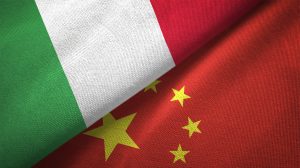The Diplomat author Mercy Kuo regularly engages subject-matter experts, policy practitioners, and strategic thinkers across the globe for their diverse insights into U.S. Asia policy. This conversation with Rachel Rizzo – nonresident senior fellow at the Europe Center, Transform Europe Initiative, Atlantic Council and co-author of the report “Dispatch from Rome: Political stability gives Italy a chance to step into the spotlight” – is the 413rd in “The Trans-Pacific View Insight Series.”
Analyze the evolution of Italy’s foreign policy under Prime Minister Giorgia Meloni.
During Meloni’s campaign, leaders in Washington and Brussels used her candidacy as both an example and a warning: here’s what happens when right-wing populism runs unchecked, and here’s what her prime ministership could mean for democracy. On the global stage, neither of those warnings have come to pass; Meloni has been incredibly transatlantic in her approach. She is pro-NATO, has welcomed Ukrainian refugees and supported Ukraine in its fight against Russia, and has bolstered Italy’s role in the Mediterranean region.
Evaluate Meloni’s balancing of China-Italy relations after Rome withdrew from the Belt and Road Initiative (BRI).
Italy’s decision not to renew its MOU [memorandum of understanding] with China for the BRI wasn’t meant to be antagonistic; it was rooted in the reality that the partnership hadn’t been that economically beneficial for Italy. In 2022, for instance, China imported $26.9 billion in Italian goods, compared with $21.4 billion in 2019. During that same period, Chinese exports to Italy rose to $50.5 billion from $33.5 billion. There’s a clear imbalance.
Despite the non-renewal, Italy still plans to, according to Meloni, “improve [its] cooperation with China on trade, the economy.” Time will tell how that develops.
In its G-7 presidency, explain Rome’s approach toward China-Europe economic integration.
When it comes to China, the worry for most European leaders is multifold: first, they want to ensure Europe de-risks, not decouples, from China given the important economic role both sides play for one other.
Two, they want to make sure not to get caught in a broader geopolitical tug-of-war between the U.S. and China.
And three, they want to ensure a joint approach toward China amongst most (hard to say “all”) EU members.
Ensuring a joint vision amongst Europeans, and balancing between politics and economic necessity, are no easy tasks. Italy is middle-of-the road when it comes to its stance on China-Europe economic integration – It both understands the risk and sees the necessity of the partnership.
Examine Italy’s calculus toward China-Russia cooperation vis-à-vis the Ukraine war.
It’s not that Italy is on one side or the other of the “Russia-China partnership” debate, it’s that it’s actually extremely difficult to tell whether this partnership really is “no-limits,” as the two sides declared last year, or, if there are limits, where those limits lie. Clearly, both Russia and China want to see a world order that is not led by the United States. At the same time, Russia and China need different things from the global system to succeed – China needs economic integration and stability, and Russia needs to be able to sow chaos and create instability. It’s hard for any country to make a clear calculus of how the relationship might develop into the future.
Assess the impact of Italy’s G-7 leadership on China-U.S. strategic competition in Europe.
Italy is using its turn at the G-7 presidency to rebuild its relationships with the Global South and bring a renewed sense of prioritization to the Mediterranean region. China is years ahead of the EU (and the U.S., for that matter) in terms of building long-term partnerships in Africa, so Italy and the EU have a long way to go on this front.
Developing governance mechanisms for AI is also at the top of Italy’s G-7 priority list, which puts the EU and China head-to-head on how emerging technology should be regulated and governed.
The hard part is to ensure the “China challenge” doesn’t become the key driver for various geopolitical projects and priorities. It’s important, surely, but viewing everything through the lens of China risks undermining long-term partnerships with nations who may not be willing to choose between East and West, and that’s okay.
































